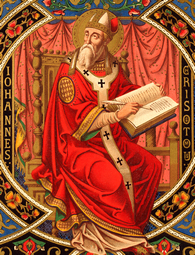Lives of the Saints
Our Models and Protectors
Spiritual Bouquet:
January 27

Saint John Chrysostom
Bishop of Constantinople,
Doctor of the Church
(344-407)
Saint John Chrysostom, born in Antioch in 344, was endowed with a superior genius strengthened by a brilliant education. In order to break with a world which admired and courted him, in 374 he retired for six years to a neighboring mountain, having found Christ through his friendship with Saint Basil. After acquiring the art of Christian silence, he returned to Antioch and there labored as a priest under the direction of its bishop. His eloquence was such that the entire city, up to a hundred thousand listeners, came to hear him, a young man not yet thirty years old. He fled this popularity and adopted the monastic life for fourteen years, until he was taken forcibly to Constantinople, to be consecrated Patriarch of the imperial city in 398.
The effect of his sermons was everywhere marvelous. He converted a large number of pagans and heretics by his eloquence, then in its most brilliant luster, and constantly exhorted his Catholic people to frequent the Holy Sacrifice. In order to remove all excuse for absence he abbreviated the long liturgy then in use. Saint Nilus relates that Saint John Chrysostom, when the priest began the Holy Sacrifice, very often saw many of the Blessed coming down from heaven in shining garments, eyes intent, and bowed heads, in utter stillness and silence, assisting at the consummation of the tremendous mystery.
Beloved as he was in Constantinople, his denunciations of vice made him numerous enemies. In 403 these procured his banishment; and although he was almost immediately recalled, it was not more than a reprieve. In 404 he was banished to Cucusus in the deserts of the Taurus mountains. His reply to the hostile empress was: Chrysostom fears only one thing — not exile, prison, poverty or death — but sin.
In 407, at sixty-three years old his strength was waning, but his enemies were impatient and transported him to Pytius on the Euxine, a rough journey of nearly 400 miles. He was assiduously exposed to every hardship — cold, wet clothing, and semi-starvation, but nothing could overcome his cheerfulness and his consideration for others. On the journey his sickness increased, and he was warned that his end was near. Thereupon, exchanging his travel-stained clothes for white garments, he received Viaticum, and with his customary words, Glory be to God for all things. Amen, passed to Christ. He does not have the title of martyrdom, but possesses all its merit and all its glory. He is the author of the famous words characterizing Saint Paul, object of his admiration and love: The heart of Paul was the Heart of Christ.
Little Pictorial Lives of the Saints, a compilation based on Butler's Lives of the Saints and other sources by John Gilmary Shea (Benziger Brothers: New York, 1894); Les Petits Bollandistes: Vies des Saints, by Msgr. Paul Guérin (Bloud et Barral: Paris, 1882), Vol. 2